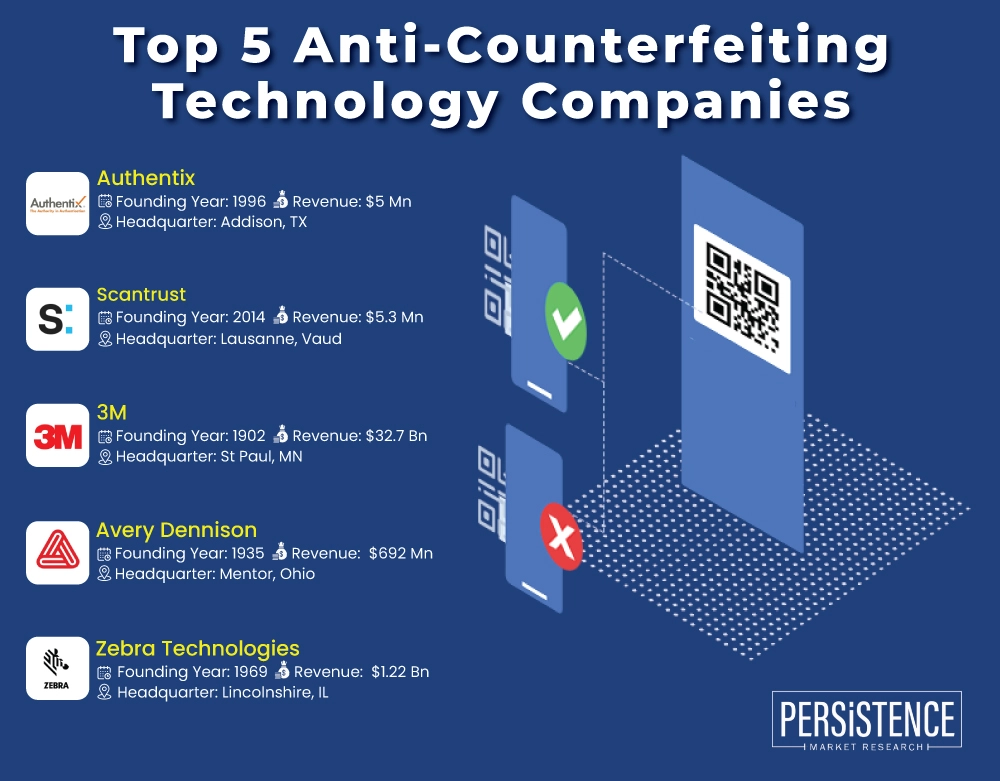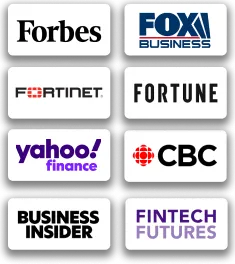- Blog
- Top 5 Anti Counterfeiting Technology Companies Shaping The Future
Top 5 Anti-Counterfeiting Technology Companies Shaping the Future
Published On : 30 Sep 2024
Counterfeiting is a serious issue that affects both brands and consumers leading to financial losses and safety risks particularly in the pharmaceutical industry. Fortunately, anti-counterfeiting technology offers pivotal solutions through innovative packaging and authentication methods that help keep products safe and genuine.
As per the PMR's research report, the anti-counterfeit pharmaceuticals packaging market has grown steadily in past years and is expected to increase from US$130.5 Bn in 2024 to US$254.3 Bn by the end of 2031. The market is anticipated to expand at a CAGR of 10.0% during the forecast period.
Anti-counterfeiting technology companies make a real difference by creating secure packaging. They employ features like holograms and RFID tags to ensure medications' authenticity and other products' functionality. This blog delves into the definition, types and the top 5 companies in this field.

What is Anti-Counterfeiting Technology?
Anti-counterfeiting technology refers to a range of methods and solutions designed to prevent the replication and distribution of fake products. It encompasses various techniques such as holograms, QR codes, RFID tags, and digital watermarks. They enable brands to authenticate their products throughout the supply chain.
The technology is crucial in industries like pharmaceuticals, luxury goods, and electronics, where consumer safety and brand reputation are paramount. By implementing these advanced security features, anti-counterfeiting companies can protect their products, ensure authenticity, and combat the growing threat of counterfeit goods in the marketplace.
Major Types of Counterfeiting
Counterfeiting encompasses various types each with distinct characteristics and implications. Here are some key types of counterfeiting:
- Counterfeit Goods
This type involves the production of imitation products that are designed to look like genuine items. These can range from luxury goods such as designer handbags and watches to everyday items like electronics and pharmaceuticals. Counterfeit goods often violate trademark laws and can harm consumers due to inferior quality.
- Currency Counterfeiting
This involves the illegal reproduction of currency with the intent to use it as if it were legitimate. Counterfeit currency can undermine economic stability and trust in financial systems, leading to significant legal consequences for those involved.
- Document Forgery
This type includes the creation or alteration of official documents, such as identification cards, passports, and certificates. Forged documents can facilitate identity theft, fraud, and other criminal activities, posing risks to individuals and institutions.
- Intellectual Property Violations
Counterfeiting can also extend to the unauthorized use of copyrighted materials, such as music, films, and software. This type of piracy infringes on the rights of creators and can lead to significant financial losses for original content producers.
- Alteration of Legitimate Goods
This involves modifying genuine products to misrepresent their quality or origin. For example, altering expiration dates on food products or changing labels on pharmaceuticals can pose serious health risks to consumers.
Two Key Methods in Anti-Counterfeiting Technology
Anti-counterfeiting technologies can be broadly categorized into two main types:
1. Overt Technologies: These are visible features that can be easily recognized by consumers without any special tools. Examples include holograms, color-shifting inks, and security labels that display unique patterns or images when viewed from different angles.
2. Covert Technologies: These features are not easily detectable and often require specific tools for verification. Examples include RFID tags, NFC chips, and digital watermarks that allow consumers and businesses to authenticate products through scanning or specialized equipment.
Meet Top 5 Anti-Counterfeiting Technology Companies Creating Buzz
Below are five leading companies in the anti-counterfeiting landscape.
1. Authentix
Authentix is one of the top 5 anti-counterfeiting technology companies, providing secure authentication solutions to combat counterfeiting and fraud. It offers innovative products, including advanced digital authentication technologies and secure supply chain solutions. The company utilizes unique identifiers and covert markers to ensure product integrity, enabling companies to verify the authenticity of its products throughout the supply chain. Its solutions are widely used in pharmaceuticals, consumer goods, and government industries.
2. Avery Dennison Corporation
Avery Dennison Corporation offers a range of anti-counterfeiting solutions through its intelligent labeling and packaging technologies. Its products include RFID tags, holographic labels, and digital printing solutions. These solutions enhance product traceability and security. By integrating these technologies, Avery Dennison helps brands protect their products from counterfeiting while providing consumers with verification tools to ensure authenticity. These efforts have helped Avery Dennison Corporation to stand out among the top 5 anti-counterfeiting technology companies.
3. Scantrust
Amidst, the top 5 anti-counterfeiting technology companies, Scantrust provides a cloud-based platform. It combines secure QR codes with blockchain technology to enhance product authentication. Its solutions allow brands to create unique, trackable codes for each product, enabling consumers to verify authenticity through a simple scan. Scantrust's technology is particularly effective in industries like food and beverage, cosmetics, and pharmaceuticals, where product integrity is crucial.
4. Zebra Technologies Corporation
Zebra Technologies Corporation focuses on providing visibility solutions that include anti-counterfeiting technologies. It offers innovative RFID solutions, barcode scanning, and mobile computing devices. These solutions help businesses track and authenticate products throughout the supply chain. The company enables real-time data capture and analysis, ensuring product authenticity and reducing the risk of counterfeiting. With a focus on innovations and consumer safety, Zebra Technologies is recognized among the top 5 anti-counterfeiting technology companies.
5. 3M
3M is known for its innovative anti-counterfeiting solutions, including security films, holograms, and tamper-evident labels. Its products are designed to protect brands and consumers by providing visible and covert security features that are difficult to replicate. These technologies are widely used across various sectors, including pharmaceuticals, electronics, and consumer goods, to enhance product security and authenticity. As these solutions define safety, the company is identified among the top 5 anti-counterfeiting technology companies.
In a Nutshell
The fight against counterfeiting is more critical than ever, and these top five anti-counterfeiting technology companies enlisted in this blog are at the forefront of this battle. By offering innovative solutions and advanced technologies, they protect brands and ensure consumer safety and trust.
As counterfeiting continues to evolve, these companies will play a pivotal role in developing more innovative, effective strategies to combat this growing threat. Staying informed about their advancements can help businesses and consumers navigate the complexities of product authenticity in today’s market.
Industry Report

Anti Counterfeit Pharmaceuticals Packaging Market
200 Pages |1 Feb 2026
Format: PDF, Excel, PPT*
Request Report Sample
Your privacy is important to us; your data is secure
Contact Us
Latest Reports
-
Opacifying Ingredient Market by Product Type (Titanium Dioxide, Opaque Polymers, Others), Formulation Type (Solid/Powder, Liquid/Slurry), Application (Paints & Coatings, Personal Care, Others), and Regional Analysis 2026 - 2033
-
Lip scrub market by Product Type (Matte, Gelatinous), Price Range (Below US$5, US$5 – US$10, US$10 – US$15, Others), Sales Channel (Modern Trade, Convenience Store, Departmental Store, Drug Store, Online Stores, Others), and Regional Analysis for 2026 - 2033
-
Leather Sneakers Market by Product Type (Athletic Leather Sneakers, Casual Leather Sneakers, Fashion Leather Sneakers), Material (Full-Grain Leather Sneakers, Top-Grain Leather Sneakers, Split-Grain Leather Sneakers), and Regional Analysis for 2026 - 2033
-
Hull Coatings Market by Product Type (Self-polishing Coatings SPCs, Fouling Release Coatings FRC, Others), Applications (Rings, Vessels, Liquefied Natural Gas Carriers, Others), and Regional Analysis for 2026 - 2033
-
Steering stabilizers market By Product Type (Linear, Rotary), Vehicle Type (Passenger Vehicle, Light Commercial Vehicle, Heavy Commercial Vehicle), Sales Channel (Original Equipment Manufacturing [OEM], Aftermarket), and Regional Analysis for 2026 - 2033
